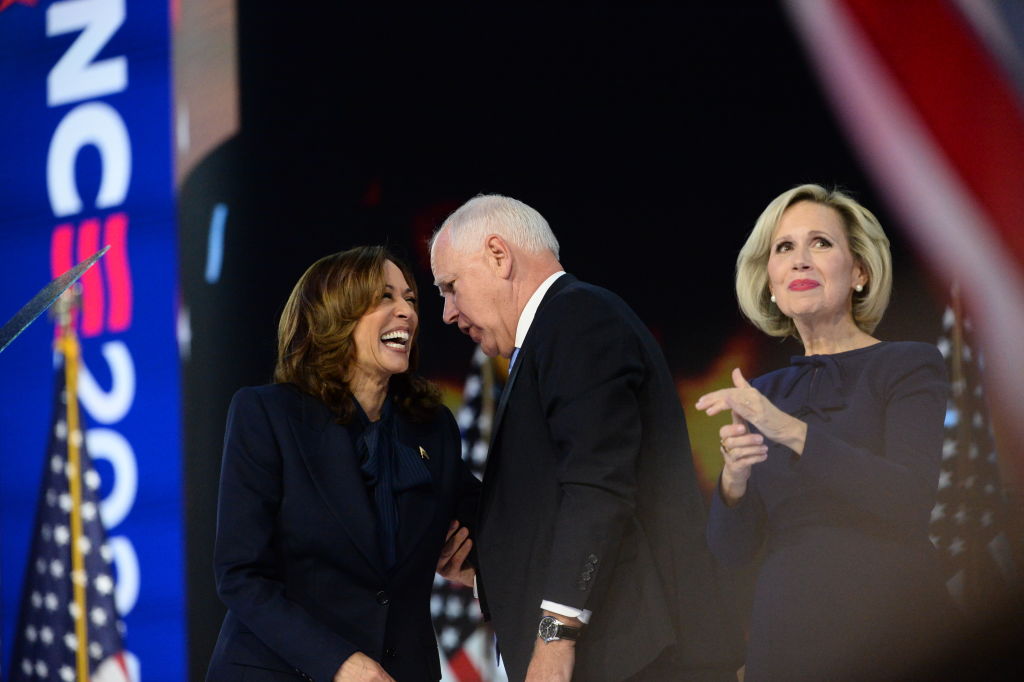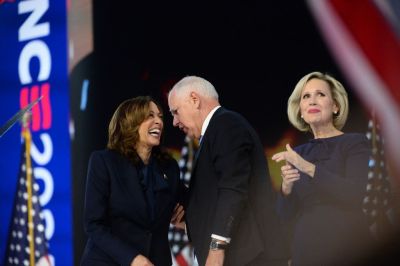
The remaining proponents of partisan primary elections as a means for parties to choose their candidates mostly rest their arguments on the virtues of popular sovereignty.
When former President Donald Trump attacks Democrats for ditching their old—literally, folks—nominee, he argues that it is the blue team that is “the real threat to democracy.” We might be forgiven for taking lightly the motivated reasoning of a candidate who, as an incumbent, used the party apparatus to crush dissent.
Whatever his motives, Trump certainly has a point. The central purpose of the primary system as we know it is to bind general election candidates to the will of the people of their respective parties. Conventions led by party elites are good for choosing electable candidates, but primaries are good for choosing ideologically rigid ones.
The journey that took America’s presidential nominations from the smoke-filled room to the living rooms of Iowa and New Hampshire began in Chicago in 1968. Maybe it ended there this year.
Republicans who had hoped for a replay of the bloody chaos of the year that broke the Democratic Party for more than two decades were badly disappointed. The protesters outside were barely a sideshow, and the sentiments inside on the issue of Israel, the most divisive point for the party, were mostly loving.
Part of the reason was that Democrats nullified their primary results this year when party bosses forced their elected nominee, President Joe Biden, out of the race a month before the convention and swapped in a better candidate for the general election, Vice President Kamala Harris. It was a very direct repudiation of a movement that began in Chicago 56 years before.
The Democratic presidential nominee of 1968 was Hubert Humphrey, also a vice president, and also imagined by party bosses to have a better chance of winning than the president for whom he served. Like Harris, Humphrey won zero primaries but got the nomination anyway. But unlike with Harris, the Humphrey switcheroo was very unpopular with rank-and-file Democrats.
In those days, there were some primaries, but they were mostly beauty contests that gave party leaders a chance to gauge the sentiment at the grassroots level. They also let untested candidates show party elders that they could mount an effective general election campaign.
What the Democrats opposed to the Vietnam War wanted in 1968, however, was to use those primaries to change the direction of the party. When President Lyndon Johnson dropped out of the race in March after a meager victory in New Hampshire, it seemed as though they would get their way. But the bosses were not about to let the hippies have their way, and pushed Humphrey though.
It would be their last win, at least until Harris.
The post-1968 reforms were meant not to produce electable candidates, but to prevent parties from putting undue emphasis on electability. In order to get a ticket to ride for the general election, a presidential candidate would have to win over activists in a series of low-turnout, small-state primary contests. That can be done with charm and winsomeness, but is also done by policy negotiation.
There are many reasons Trump won the 2016 Republican nomination, but none more potent than him outbidding his rivals on the issue of immigration. How did Barack Obama get around Hillary Clinton in 2008? Persona, sure, but he needed policy pressure, too. Activists know that these positions may be unpopular in the general election, so they force primary candidates to hug them tight in order to make it harder to disown them in the general election.
For the 13 presidential elections between 1968 and 2024, we have been able to observe the same life cycle for campaigns: Candidates run to the far left or far right to get past their rivals in the primaries, and then try to sprint to the center to win the general election.
This time, Democrats cracked their nominee out of a chrysalis, where she had apparently spent four years in metamorphosis from a hard-core progressive to a commonsensical moderate. The reinvention of Kamala Harris is still a bit jarring at this distance from her leftward lurch of 2020, but would have been absurd if it had been executed in the six weeks since the presidential primaries would have wrapped up in a competitive year.
The enthusiastically patriotic, moderate-sounding, pro-Israel, proud former prosecutor we heard this week in Chicago is exactly the kind of candidate who could give the Republicans a terrible beating in Novemeber. She’s also the kind of candidate who could have never, ever emerged from a competitive Democratic primary process.
If Harris is able to beat Trump, Republicans will no doubt envy Democrats’ ability to be “unburdened by what has been,” and will surely seek to obtain some similar advantage for 2028. Letting fewer than a million hyper-engaged voters in a handful of primary states pick their nominee will surely look unappealing—especially after 12 years of the tyranny of the plurality with Trump.
It took the fear of a Trump restoration to make Democrats willing to get over the imagined virtues of primary elections. Maybe Harris can do the same for the GOP.
Holy croakano! We welcome your feedback, so please email us with your tips, corrections, reactions, amplifications, etc. at STIREWALTISMS@THEDISPATCH.COM. If you’d like to be considered for publication, please include your real name and hometown. If you don’t want your comments to be made public, please specify.
STATSHOT
General Election
Donald Trump: 44% (↑ 0.2 points from last week)
Kamala Harris: 47.2% (↑ 0.6)
Robert F. Kennedy Jr: 5.6% (↓ 0.6)
[Average includes: WaPo/ABC News: Trump 44% - Harris 47%-Kennedy 5%; Emerson College Trump 44% -Harris 48%, Kennedy 4%; Fox News: Trump 45% - Harris 45% - Kennedy 6%; Pew: Trump 45% - Harris 46% - Kennedy 7%; Marquette Law: Trump: 42% - Harris 50% - Kennedy 6%]
Generic Ballot
Democrats: 47.8% (↑ 0.4 points from last week)
Republicans: 46.4% (↓ 0.4)
[Average includes: Emerson College 48% Democrats - 46%; Monmouth: 48% Democrats - 46% Republicans; Marquette Law: 52% Democrats - 48% Republicans; Marist/NPR/PBS: 47% Democrats - 45% Republicans; CNBC: 44% Democrats - 47% Republicans]
TIME OUT: JINGS! CRIVENS!
Wall Street Journal: “Any visitor to Stonehenge in southern England will have marveled at how prehistoric Britons managed to transport, carve and carefully arrange the large standing stones that can weigh up to 30 tons. Now it turns out one of those stones—the 6-ton altar stone at the center of the prehistoric monument—came all the way from the northernmost tip of Scotland some 430 miles away, much farther afield than originally thought. … It also suggests that ancient Britain was more connected than previously thought, with parts of the monument coming from England, Wales and now Scotland. … A collection of slightly smaller stones in the inner part of the monument, called the bluestones, were ‘foreign’ and didn’t match anything found locally. … Anthony Clarke matched the stone to the Orcadian Basin in northern Scotland, which extends to the Orkney and Shetland islands. A remaining mystery is how the stone got to Stonehenge.”
KENNEDY QUITS, GOES MAGA IN DEAL FOR GIG WITH TRUMP
Wall Street Journal: “Independent presidential candidate Robert F. Kennedy Jr. said he would suspend his election bid and endorse Donald Trump, potentially boosting the Republican former president just after Democrats left their convention with renewed hope for a win. … In explaining his decision to back Trump, Kennedy said that the principles that persuaded him to leave the Democratic Party and run as an independent now led him to back the former president. He cited protecting free speech, among other examples. Polls indicate that Kennedy’s departure will likely help Trump, providing some welcome news for a candidate who has struggled to counter the momentum of his Democratic opponent, Vice President Kamala Harris. … At the rally, Kennedy suggested that Trump, with whom he has spoken to in recent weeks, had asked ‘to enlist me in his administration.’ He said he tried to meet with Harris and she declined.”
BRIEFLY
Montana joins seven other states with abortion referenda on the ballot this fall, a boon to Tester—Associated Press
Democrat Petola comes out on top in Alaska House primary, looking for divided GOP to deliver win in ranked-choice general election—New York Times
Vance and Walz both relatively little known, but Walz has edge on favorability —AP
“I’m not amused by it”: Pelosi rebuffs fans who call her “the godmother” for her role in ousting Biden—Politico
Georgia election boards brace for bitter fighting in November —Axios
SCOTUS backs, partly, GOP-led effort for Arizona voter restrictions—The Hill
Trump plumps for sons’ cryptocurrency bank—CNBC
WITHIN EARSHOT: CRUNK COMMITTEEMAN
“From the window to the Walz” — Alternate lyrics to his hit “Get Low” as performed by rapper Lil Jon on behalf of the Georgia delegation to the Democratic National Convention.
MAILBAG
“It seems to me that, as the GOP has traditionally been the ‘law and order’ party, to wish upon the citizens of Chicago massive civil unrest is downright, well … uncivil.”—Michael Harkins, Philadelphia, Pennsylvania
Mr. Harkins,
Politics visits some strange wishes on people.
In 2004, for example, Democrats needed the Iraq war to get worse sooner rather than later. The thinking expressed in private to me by Democrats I knew and covered as a still-boyish political editor was that the suffering of troops at the moment would actually save lives in the long run since reversals in the war effort would lead to George W. Bush’s defeat, allowing John Kerry to bring an end to the war.
A more quotidian version of this is when the party out of power invariably talks down the economy, warning of recession and collapse even in periods of prosperity. One could argue that the politically motivated pessimism contributes to actual consequences for investors and workers.
There’s also the natural, if unhelpful, human desire to see the people we dislike get what (we think) they deserve. Many Republicans believe that Democrats have succored radicalism and turned blind eyes to antisemitism, which would make the protests just deserts. So too with the pernicious crime and chronic mismanagement of the city of Chicago under decades of Democratic rule, which conservatives have long and pointedly chronicled. So the thinking would follow that it would serve the blue team right.
Like most things, though, this is a matter of degrees. When you watch a football game, you may hope the other team’s quarterback fumbles the ball at the goal line, but—I hope—not that he is injured and knocked out of the game. Sadly, many fans cross that line.
We can excuse a little schadenfreude in ourselves when our foes get what we think they deserve, the karmic boomerang for what we believe to be their bad behavior or wrong choices. But that’s where magnanimity is supposed to come in. We reach out our hands and help the other guy get back on his feet.
What is so dangerous about the way some of our politicians and much of the political media tend to function these days is how it encourages us not to think of our opponents as wrong or misguided, but as evil—enemies rather than rivals. Republicans who wished for chaos and “American carnage” in Chicago didn’t do any harm to Democrats, but it did come at a price for themselves. Wishing ill on other people is corrosive to our character and perpetuates the cycle of resentment. And if the hoped-for boomerang doesn’t arrive, we are doubly embittered.
Understanding the difference between wanting to win and hoping the other team loses is part of the unending work of mature adulthood, work that the powerful narcotic of negative partisanship can prevent us from doing if we allow it to.
All best,
c
You should email us! Write to STIREWALTISMS@THEDISPATCH.COM with your tips, kudos, criticisms, insights, rediscovered words, wonderful names, recipes, and, always, good jokes. Please include your real name—at least first and last—and hometown. Make sure to let us know in the email if you want to keep your submission private. My colleague, the vacated Nate Moore, and I will look for your emails and then share the most interesting ones and my responses here. Clickety clack!
CUTLINE CONTEST: UP, UP, AND AWAY

I love Cutline Contest photos that aren’t of famous political figures. I think it brings out the best in our entrants and tends to discourage recycled jokes. And this one is even better, because the picture itself is just plain funny. Our winner neatly put the theme of last week’s note together with the photo and did it in real Associated Press cutline style. Beautiful.
“Workers place balloons to lift United Center off the ground, thereby avoiding protesters.”—Jack Funke, Poplar Bluff, Missouri
Winner, Macroplastics Division:
“Dems release thousands of balloons to celebrate environmental bona fides.”—Bob Goldman, Gilroy, California
Winner, Verne-al Division:
“DNC staffers Fogg and Passepartout depart for ‘Around America in 80 Days’ tour 8/17/24.”—Linda McKee, DuBois, Pennsylvania
Winner, F Troop, Season 2, Episode 3, Division:
“Plainclothes Secret Service operatives rush to investigate suspected Chinese surveillance of the Democratic National Convention.”—Bill Ward, St. Augustine Beach, Florida
Winner, Transitory Division:
“All hail as we demonstrate the raw power of inflation!”—Jeff Tatusko, Plum, Pennsylvania
Winner, Reality Based Division:
“DNC workers claim event balloons real, not AI”—David Porter, Tampa, Florida
Winner, Bey-loons Division:
“K-Hive flash mob dancers practice their choreography prior to the Democratic National Convention”—Jonathan Mahlum, Orting, Washington
Winner, Making Waves Division:
“99 bright red balloons go ‘bye’”—Michael Smith, Georgetown, Kentucky
THAT FAMOUS GERMAN MILITARY HUMOR
The (London) Telegraph: “The German navy has made its presence known in London by blaring out the Darth Vader theme as one of its warships advanced up the River Thames. Londoners looked on as the German warship was towed slowly past Butler’s Wharf on the South Bank near Tower Bridge. The Braunschweig F260 ship played the Imperial March track from the Star Wars saga as it floated by. In footage of the arrival, sailors can be seen on deck dressed in light blue shirts, dark trousers and navy blue life jackets. A German navy spokesman told The Telegraph: ‘The commander can choose the music freely. The choice of music has no deeper message.’... A spokesman for the German Embassy in London said: ‘The commander of the corvette FGS Braunschweig is a big Star Wars fan and an admirer of the legendary musical scores of John Williams. He chooses a different Williams tune whenever his ship is visiting a foreign harbour.’”
Nate Moore contributed to this report.






Please note that we at The Dispatch hold ourselves, our work, and our commenters to a higher standard than other places on the internet. We welcome comments that foster genuine debate or discussion—including comments critical of us or our work—but responses that include ad hominem attacks on fellow Dispatch members or are intended to stoke fear and anger may be moderated.
With your membership, you only have the ability to comment on The Morning Dispatch articles. Consider upgrading to join the conversation everywhere.